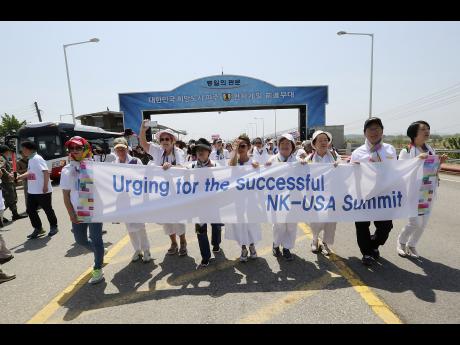Worried, hopeful and wary - Neighbours await Kim-Trump summit
TOKYO:
North Korea's East Asia neighbours - Japan, China and South Korea - have a shared goal of denuclearizing the peninsula, but what may come out of Tuesday's summit in Singapore between President Donald Trump and North Korea's Kim Jong-Un has different and possibly conflicting implications for their security, economic and geopolitical interests.
Here are the views and concerns of the three stakeholders:
Worried Japan
Japan, a US ally whose diplomatic policies largely mirror Washington's, is relying on Trump because Prime Minister Shinzo Abe has been unable to meet Kim. Japan worries about being marginalised by other regional players who have increased their interaction with North Korea. Abe doesn't want Trump to strike a compromise on North Korea's missile programme that would leave Japan exposed to shorter-range missiles that do not reach the US mainland, or would relieve pressure on North Korea before it takes concrete steps towards complete denuclearization. If Trump focuses on long-range missiles and a peace treaty, which might lead to a reduction of US troops in South Korea, it would pose a security risk for Japan, analysts say.
The best scenario for Japan would be a commitment by Trump to diplomatic engagement to achieve North Korea's complete denuclearization and his help in getting the North to make progress on the abduction issue. Japan says at least 17 Japanese were abducted by North Korea to train its spies in Japanese language and culture. North Korea has acknowledged abducting 13 and allowed five of them to visit Japan in 2002, where all five remained. Japan says it would normalise diplomatic ties and provide economic aid as rewards for a North Korean commitment in both the nuclear and abduction issues.
Hopeful but sceptical South
South Koreans have been split between hope and doubt after seeing the see-saw developments leading up to the summit. They hope that improved relations between the US and North Korea would ease tensions, adding momentum for inter-Korean reconciliation and cooperation. Some even speculate that Trump and Kim may discuss a peace treaty formally ending the 1950-1953 Korean War, replacing the current armistice. A peace treaty, however, would raise North Korea's long-time demand for a reduction or withdrawal of US troops in South Korea. Sceptics say that's too much to consider and that the priority should be getting North Korea to give up its nuclear weapons.
Reducing the threat of conflict is the initial goal, which could be followed by cultural, humanitarian and economic steps.
Cautious China
Trump has long leaned on China to convince North Korea to moderate its actions, despite protests from Beijing and some experts that China's influence may be overstated. But the success or failure of the summit will be seen by some as an indication of China's status as a major player in Northeast Asia, something Beijing has long craved. A positive outcome in Singapore may also ease pressure on Beijing in its simmering trade disputes with Washington and complaints over its militarization of disputed South China Sea islands.
Beijing wants to ensure its interests are preserved in the negotiations, namely, that no outcome leads to a pro-US united Korea and the stationing of potentially hostile troops along its border. In the near term, China has repeatedly called for a freeze in large-scale US-South Korea military exercises in return for a halt to the North's nuclear and missile programmes. Beijing also backs the North's call for a "phased and synchronous" approach to denuclearization, as opposed to Washington's demand for an instant, total and irreversible end to the North's nuclear programmes.

